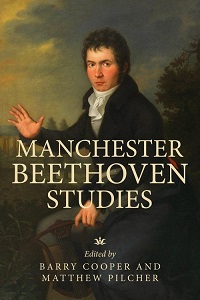
Manchester Beethoven Studies
Edited by Barry Cooper and Matthew Pilcher
348 pp Hardback
ISBN: 978-1-5261-5568-9
First published 2023
Manchester University Press
While Wagner is reputedly the most written about classical/romantic era composer Beethoven’s tally is no write-off and snaps at his heels. Here in this book is the latest addition to the Beethoven English language literature; one wonders whether the English language has served to exclude other contributions on the chosen subjects. Collections of this sort also make me wonder about the rationale behind selection: what has been left out? As for the former, the ‘linkage’ apart from the obvious appears to be Manchester University and its various Beethoven conferences.
The book collects a compendium of ten years of Manchester University’s study of Beethoven. Messrs Cooper and Pilcher fill in the symposium background in the ‘intro’ then we are straight into a variegated ocean of writing. You can get a handle on the encompassed landscape by looking at the section titles listed below.
As a collection of essays it is quite a variegated grape-shot salvo rather than a single huge projectile. As an amalgam of voices and stances it hits a span of vistas and deals with each in seemingly punctilious and meticulous detail. That span leans towards technical musicological academe and ‘deep dive’ extreme Beethoven enthusiasts.
It’s an attractively presented case-bound book of approaching 350 pages and, given its choice of colours and fonts, will stand out invitingly in bookcases. One quibble: I do not like the use of block capitals for the word “EDS” on the spine. It should have been “Eds.”
As for the present appraisal it is certainly not a ‘peer review’. In fact in relation to the present writer’s role (not my audience, if any) I am reminded of a stinging observation by Frank Zappa on writers about music. This was recently quoted on a BBC Radio 4 Zappa profile. He described them as “People who can’t write talking to people who can’t talk in order to prepare articles for people who can’t read.” With those encouraging words let’s set about the task.
The book comprises ten essays, an introduction and writer profiles. There’s an overarching index which enables broader access. In addition there are extensive chapter end-notes, music exx. and tables. All of this is accommodated in a really well-turned out hardback. As I say, given the range of coverage, these essays will play more easily to academic seekers as well as ultra-enthusiastic devotees.
Barry Cooper’s name is very familiar and likely to be to other Beethoven generalists. To me Cooper’s name rings a bell as the person who realised Beethoven’s Tenth Symphony (written before the Ninth) – in its single-movement (15-minute) format. It was prominently recorded in Wyn Morris’s Beethoven cycle and as a one-off from Douglas Bostock.
From the notes at the end of each essay you can begin to trace provenance and foundation. These minutiae may resist the general reader who is not an out-and-out Beethoven fanatic or academic. Such books in their ‘questing beast’ immersion in research and even speculation are a function of publics still obsessively gripped by Beethoven’s music. The trick is to take from this collection what is of reward and value to you; perhaps at least temporarily leave aside the writing you find more arcane.
Some of the essays yield more easily to the general Beethoven readership. Of the ten essays the following offer the most accessible spoils. ‘Beethoven ‘s View of Scotland’ and ‘Beethoven and Charles Hallé’ – a Beethoven champion in Manchester in the nineteenth century. The other eight, to varying degrees, are more suited to the Beethoven-leaning musicologist or performer. They delve into aspects of the composer and of his music. Thus, variation form and wind music are dissected. Specific works (String Quintet Op. 104, Erste Liebe, Himmelslust WoO92, Dittersdorf Variations) are examined, as are facets of style such as slowness in the composer’s late music. An aspect (faith and belief) of the inner man is the subject of one essay.
This book will be a natural compulsory purchase for libraries. Then again there are Beethoven-leaning musicians and others, perhaps those who have gone for the immersive listening experiences associated with the varyingly complete Beethoven cycles issued during 2020 (Beethoven 250) by Warner, Universal and Naxos.
The index provides the unifying glue and a belvedere from which to reach into the entrails of this very diverse assemblage of Beethoven scholarship that rotates like satellites around the central reference point that is Manchester.
Rob Barnett
Help us financially by purchasing from


Contents
Introduction – Barry Cooper and Matthew Pilcher
1 Beethoven’s indebtedness to his teacher Christian Gottlob Neefe: a comparison of their Variations on Themes by Carl Ditters von Dittersdorf – Kris Worsley
2 Beethoven’s Erste Liebe, Himmelslust, WoO 92: sources, languages, text-setting – Matthew Pilcher
3 Situating Beethoven’s chamber music with wind: genre, topic and transcription – Martin Harlow
4 Beethoven’s variation sets and the role of the slow variation – Artur Pereira
5 A hermeneutic approach to word cues in the score of Beethoven’s Concerto No. 4 in G major for pianoforte and orchestra, Op. 58 – Sara Eckerson
6 Born under a gloomy star: new perspectives on Beethoven’s String Quintet Op. 104 – Jos van der Zanden
7 Transcending slowness in Beethoven’s late style – Marten Noorduin
8 Beethoven’s faith and beliefs in the context of his age: some unexplored avenues and reassessments, with special reference to Sailer – Susan Cooper
9 Beethoven’s view of Scotland – Barry Cooper
10 Charles Hallé: a Beethoven champion in Manchester – Siân Derry
Index


















